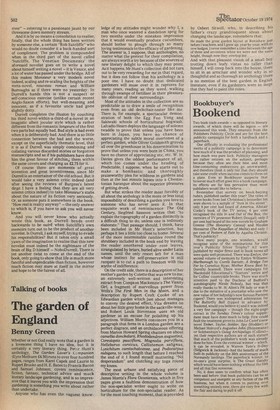Bookbuyer's
Bookend
Two book trade awards — as opposed to literary awards, of which there will be legion — are announced this week. They emanate from the Publishers Publicity Circle and are for the best publicity campaigns for both a hardback and a paperback. One difficulty in evaluating the professional merits of a publicity campaign is to determine how much of it was the product of planning, and how much was pure luck. Publicity managers are rather reticent on the subject, perhaps because they often see their best and most time-consuming endeavours go unrewarded, and therefore think it only fair that they should take some credit when success comes to them on a plate. Even so Bookbuyer suspects that however much effort goes into a book campaign, its effects are far less pervasive than most publishers would like to believe.
Remember that survey on book-buying habits, published earlier this year? The titles of seven books from last Christmas's bestseller list were shown to a sample of "men in the street": only 8 per cent had heard of America, Alistair Cooke's book of the TV series; 6 per cent
recognised the title In and Out of the Box, the memoirs of TV presenter Robert Dou gal I; only 2 per cent had heard of the new novels by Graham Greene (The Honorary Consul) and Nicolas Monsarrat (The Kappillan of Malta) and only 1 per cent of Postern of Fate by Agatha Christie. That's publicity?
How many people, one wonders, would recognise some of the nominations for this year's Publicity Silver Trophy? All were
published by major firms and in book terms all were quite well promoted. There was Emlyn, the
second volume of memoirs by Emlyn Williams;
,Mar/borough by Corelli Barnett; A Bridge Too Far by Cornelius Ryan; Mother Knew Best by
Dorothy Scannell. There were campaigns for Macdonald Educational's "Starters" series and for Collins' countryside books. There was much attention paid to the Duchess of Bedford's
autobiography Nicole Nobody, but was that really thanks to W. H. Alien's PR lady or was it
due to the initiative of a journalist who saw the new value of her ladyship's now famous Parisien capers? There was widespread admiration for
The Butterfly Ball (tipped in advance by
Bookend, would you believe it) and it was indeed a very fine campaign — though the eight-page
extract in the Sunday Times's colour supple
ment must have done much to help. Few could fault the treatment given to John Le Carrd's new
novel Tinker, Taylor, Soldier, Spy (Hodder) or Michael Holroyd's Augustus John (Heinemann) or Solzhenitsyn's Gulag Archipelago (Collins)-
yet their respective authors are of such stature that much of the publisher's work was already done for him. Even the eventual winner — which, it can be revealed, is Warren Tute's D-Day
(Sidgwick & Jackson)—had the benefit of much built-in publicity on the 30th anniversary of the Normandy landings. The paperback winner, to no-one's great surprise, is The Great Gatsby which would have been nothing without the film and all that fine nonsense.
No, it does seem to confirm what has often been said before: that book publieists can be as competent and energetic as any faction of the PR business; but when it comes to putting over something entirely new, there are very few with the flair and daring to pull it off.


































 Previous page
Previous page